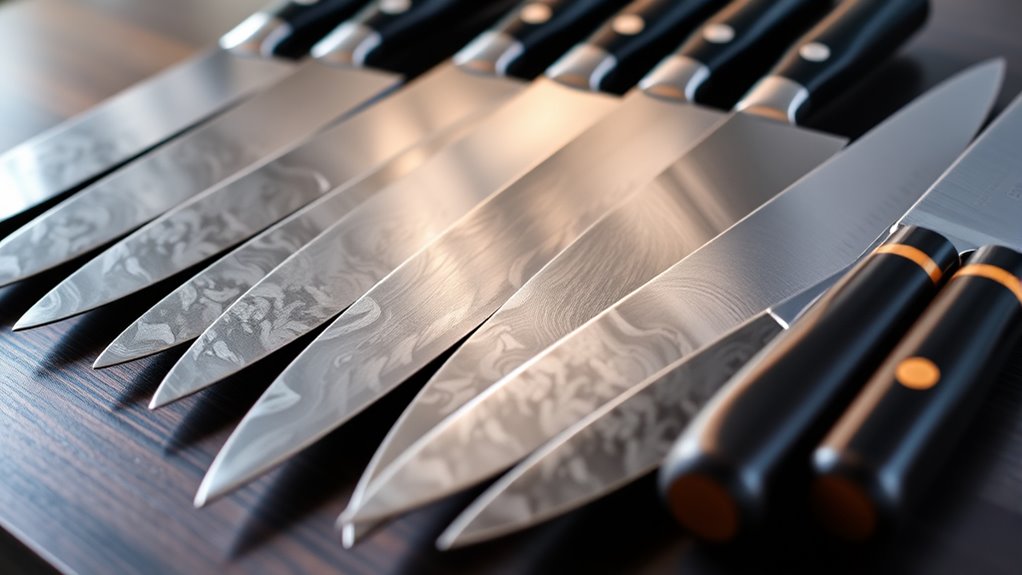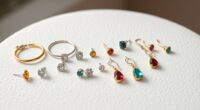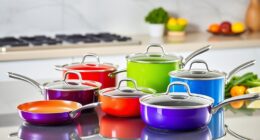If you’re looking to elevate your kitchen game, I recommend checking out the 15 best Japanese Santoku knives. These knives feature razor-sharp blades made from high-quality steels like VG10, 10Cr15CoMoV, and Damascus layers, offering durability and beauty. Handles are ergonomic and stylish, ensuring comfort during extended use. Each knife is crafted for precision and versatility, perfect for slicing, dicing, and chopping. Keep exploring to discover the top options that will transform your culinary experience.
Key Takeaways
- The top Japanese Santoku knives feature high-quality steels like VG10, Damascus layered steel, and high-carbon options for durability and sharpness.
- Ergonomic handles made from Pakkawood, G10, or exotic materials ensure comfort and control during extended use.
- Many knives incorporate traditional hand-forged techniques, layered Damascus patterns, and ultra-sharp edges for precise slicing.
- They are designed with aesthetic appeal, including layered, hammered, or polished finishes, suitable for display or gifting.
- Proper maintenance, such as hand washing and careful storage, prolongs the knives’ sharpness and overall lifespan.
imarku 7-Inch Chef Knife, Ultra Sharp Santoku Knife

If you’re looking for a versatile, professional-grade Santoku knife that can handle a variety of kitchen tasks with ease, the imarku 7-Inch Chef Knife is an excellent choice. Made from high-quality Japanese HC stainless steel, it resists rust and corrosion, ensuring durability. The ultra-sharp blade, polished to be sharper than standard knives, makes slicing, dicing, and mincing effortless. Its hollow scalloped edge prevents food from sticking, increasing efficiency. The ergonomic Pakkawood handle offers a secure, comfortable grip, reducing wrist fatigue. With a sleek design, balanced weight, and excellent reviews, this knife elevates both everyday cooking and professional culinary tasks.
Best For: home cooks and professional chefs seeking a versatile, ultra-sharp Santoku knife for precise chopping, slicing, and dicing tasks.
Pros:
- Crafted from high-quality Japanese HC stainless steel for durability and rust resistance
- Ultra-sharp blade with scalloped edges that prevent food sticking, enhancing efficiency
- Ergonomic Pakkawood handle provides a secure, comfortable grip and reduces wrist fatigue
Cons:
- Not dishwasher safe; requires hand washing to maintain sharpness and longevity
- Slightly heavier than some other knives, which may take time to get used to for some users
- The 3-month refund and 1-year exchange warranty may not cover all potential issues
7 Inch Japanese Chef Knife with High Carbon Stainless Steel Blade
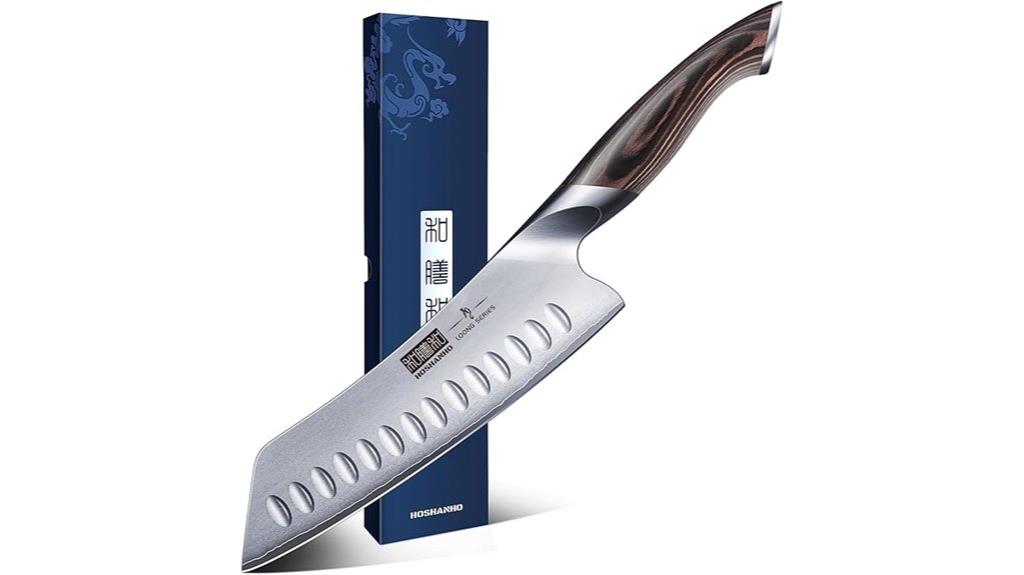
The 7-inch Japanese chef knife with a high carbon stainless steel blade stands out as an excellent choice for both professional chefs and serious home cooks who demand precision and durability. Crafted from premium 10Cr15CoMoV steel, it’s triple-layer laminated and forged for strength. With about 0.9% carbon, it’s nearly twice as hard as typical knives, reaching 62HRC, ensuring long-lasting sharpness and resistance to corrosion. Its hand-sharpened 15-degree edge delivers thinner, more accurate slices, while the double-side groove reduces sticking. The elegant frosted finish and ergonomic Pakkawood handle make it a visually appealing, comfortable, and reliable tool for all your culinary needs.
Best For: professional chefs, serious home cooks, and knife enthusiasts seeking a durable, precision-engineered Japanese chef knife for versatile kitchen tasks.
Pros:
- Exceptional sharpness and precision due to hand-sharpened 15-degree edge and high-quality laminated steel
- Durable construction with 62HRC hardness and corrosion resistance, ensuring long-term performance
- Elegant design featuring a frosted finish and ergonomic Pakkawood handle for comfort and aesthetic appeal
Cons:
- Heavier weight (approximately 12.3 ounces) may feel bulky for some users
- Not dishwasher safe; requires careful hand washing and maintenance
- Handle endcap may be sharp initially, needing bluntness before extended use
KYOKU Santoku Knife, 7-inch, VG10 Steel Damascus Blade
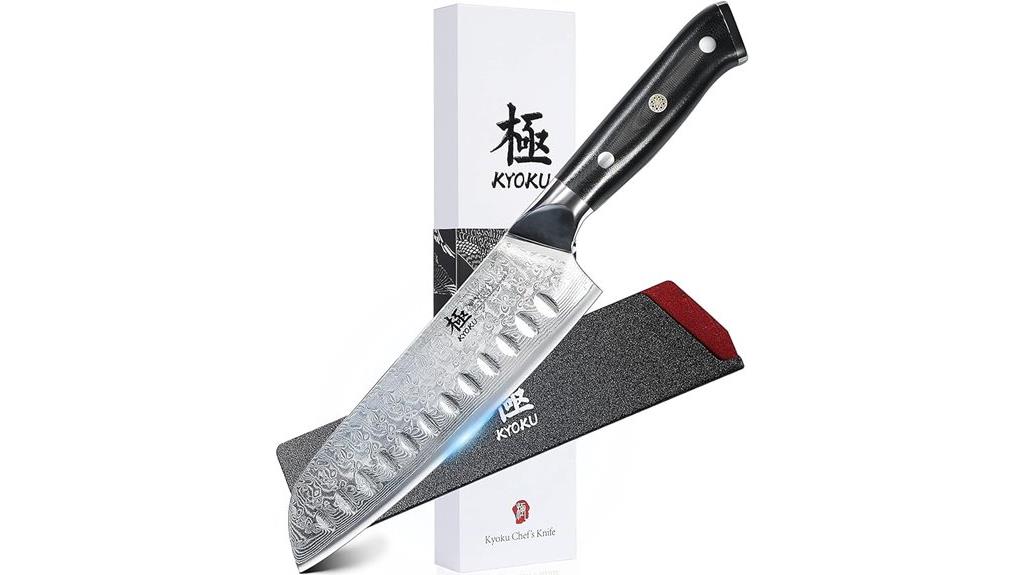
For home chefs and professional cooks seeking precision and durability, the KYOKU Santoku Knife with a 7-inch VG10 steel Damascus blade stands out as a top choice. Its layered Damascus steel and Japanese VG-10 core deliver exceptional sharpness, strength, and corrosion resistance. The full tang, forged construction, and ergonomic G10 handle ensure stability and comfort during extended use. The mirror-polished, hollow edge makes slicing effortless, while nitrogen cooling enhances hardness and flexibility. This beautifully crafted knife offers a perfect balance of performance and aesthetics, making it an excellent addition to any kitchen, whether for daily prep or intricate culinary tasks.
Best For: home chefs and professional cooks seeking a highly durable, sharp, and well-balanced Santoku knife for everyday and intricate culinary tasks.
Pros:
- Exceptional sharpness with a mirror-polished edge for effortless slicing through various ingredients
- Durable VG-10 steel core with 67-layer Damascus steel provides long-lasting performance and corrosion resistance
- Ergonomically designed G10 handle offers a comfortable, secure grip and balanced weight for extended use
Cons:
- High hardness steel may require proper technique for re-sharpening to maintain its edge
- Slight fading of the Damascus pattern can occur after extensive cleaning or dishwasher use
- No dedicated storage block included, which may require additional storage solutions
MITSUMOTO SAKARI Santoku Chef Knife 7 inch

Crafted with traditional hand-forged techniques and advanced steel treatment, the MITSUMOTO SAKARI Santoku Chef Knife 7 inch stands out as an ideal choice for serious home cooks and professional chefs who demand exceptional sharpness and durability. Made from three layers of high-carbon steel (9CR18MOV), it’s precision hardened, vacuum cooled, and nitrogen-treated for long-lasting edge retention. The ergonomic rosewood handle reduces wrist tension and offers a comfortable grip. Its ultra-thin, beautifully textured blade slices effortlessly through vegetables and meats. Paired with a sandalwood storage box, this knife combines functional performance with aesthetic appeal, elevating your culinary experience.
Best For: home cooks and professional chefs seeking a high-quality, durable, and precisely sharp Japanese santoku knife for versatile kitchen tasks.
Pros:
- Exceptional sharpness and edge retention due to high-carbon steel treatment
- Ergonomic rosewood handle reduces wrist tension and offers comfortable grip
- Beautiful textured blade with traditional hand-forged craftsmanship enhances aesthetic appeal
Cons:
- Requires careful maintenance, such as hand washing and oiling, to prevent rust
- Slightly heavier weight at 7.8 ounces may be less ideal for those preferring lighter knives
- Not dishwasher safe, which may be inconvenient for some users
Chefs Santoku Knife 7 Inch, Japanese High Carbon Steel Chef Knife
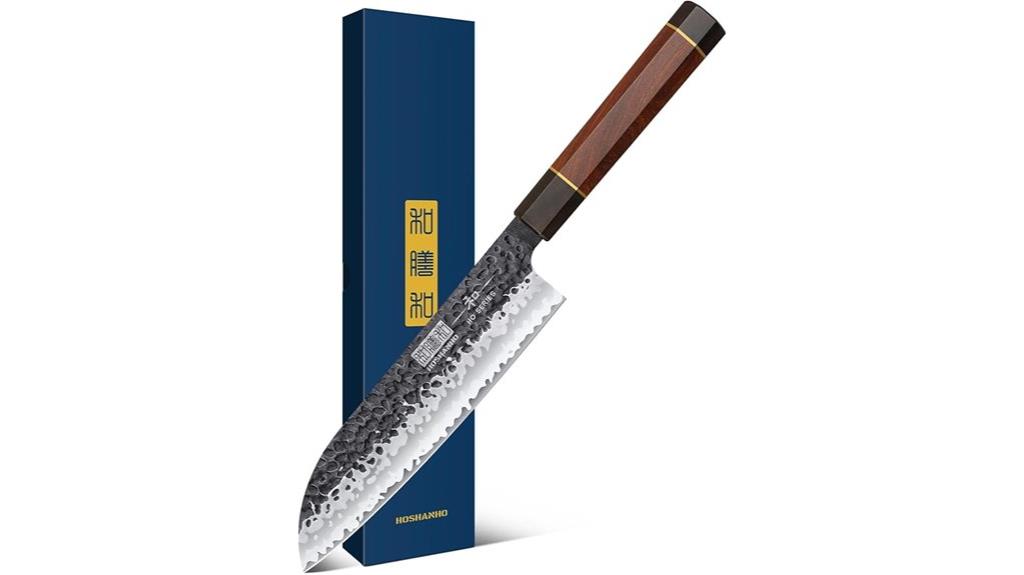
If you’re seeking a versatile and reliable kitchen knife that combines traditional craftsmanship with modern performance, the Chefs Santoku Knife 7 Inch is an excellent choice. Made from high-quality Japanese 10Cr15CoMoV super steel, it’s quenched to a 60±2 hardness, ensuring exceptional corrosion and wear resistance, plus long-lasting sharpness. Hand-sharpened by skilled craftsmen, its double-sided 12-15° edge delivers precise, smooth cuts. The elegant rosewood handle features a copper wire accent, providing both beauty and comfort. Perfect for slicing vegetables, fish, and meats, this knife offers excellent control, balance, and durability—making it a must-have for both home cooks and professionals.
Best For: home cooks and professional chefs seeking a versatile, durable, and aesthetically pleasing santoku knife for various kitchen tasks.
Pros:
- Crafted from high-quality Japanese 10Cr15CoMoV super steel for excellent edge retention and corrosion resistance.
- Hand-sharpened with a precise 12-15° double-sided edge for clean, smooth cuts.
- Elegant rosewood handle with a copper wire accent provides both comfort and aesthetic appeal.
Cons:
- The octagonal handle may require some adjustment for users accustomed to other grip styles.
- Handcrafted blades may have slight variations in appearance or sharpness.
- Not suitable for heavy-duty tasks like prying or chopping through very hard materials.
Damascus Santoku Knife 7 Inch, Japanese Damascus Steel Kitchen Knife
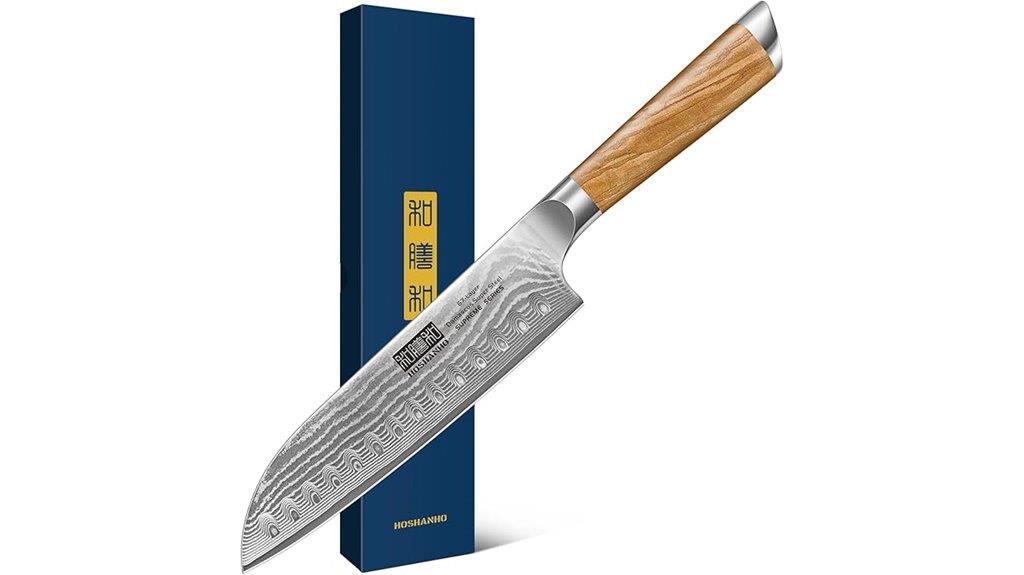
The Damascus Santoku Knife 7 Inch stands out for its striking Damascus steel pattern and exceptional sharpness, making it an ideal choice for home cooks and professional chefs who prioritize both beauty and performance in their kitchen tools. Crafted from VG-10 Japanese steel with a 62HRC hardness, it offers durability, toughness, and wear resistance. The forged blade features a razor-sharp 15-degree edge, with special grooves to reduce food sticking. Its natural olive wood handle provides comfort and balance, perfect for extended use. Although manufactured in China, this knife’s craftsmanship, unique pattern, and versatility make it a compelling addition to any kitchen.
Best For: home cooks and professional chefs seeking a stylish, durable, and sharp Santoku knife for versatile kitchen tasks.
Pros:
- Exceptional sharpness with a razor-sharp 15-degree edge for precise slicing and dicing
- Durable VG-10 Japanese steel core with high hardness and wear resistance
- Comfortable, ergonomic olive wood handle that reduces fatigue during extended use
Cons:
- Manufactured in China, which may be misleading for buyers expecting Japanese-made quality
- Some users find the layered Damascus steel less critical to performance and aesthetics
- Not dishwasher safe; requires careful hand washing and maintenance to preserve sharpness
KAWAHIRO 7-Inch Japanese Santoku Chef Knife

For serious home cooks and professional chefs who demand precision and craftsmanship, the KAWAHIRO 7-Inch Japanese Santoku Chef Knife stands out as an exceptional choice. It’s meticulously hand-forged using traditional Japanese techniques, featuring a layered VG10 steel blade with a striking black finish. The ultra-sharp 0-degree edge slices paper-thin vegetables and easily handles proteins without tearing. Its well-balanced, ergonomic handle reduces wrist strain and fatigue, making prolonged prep comfortable. Packaged in a handcrafted wooden box, this knife isn’t just a culinary tool—it’s a work of art and a reliable, durable investment that elevates your kitchen game.
Best For: serious home cooks and professional chefs who value precision, craftsmanship, and durability in their kitchen tools.
Pros:
- Hand-forged with traditional Japanese techniques for exceptional quality and craftsmanship
- Ultra-sharp 0-degree edge allows for precise, paper-thin slicing and clean cuts
- Ergonomically designed handle reduces wrist strain and enhances comfort during extended use
Cons:
- The layered steel and exotic handle materials may require careful maintenance to preserve appearance
- Handcrafted quality and premium materials can make it a higher-priced investment
- Limited to a 7-inch blade, which may not suit those needing larger or smaller knives for specific tasks
Shun Premier 7 Santoku Knife

The Shun Premier 7-inch Santoku Knife stands out as an excellent choice for home cooks and professional chefs who prioritize versatility and precision in their kitchen tools. Its all-purpose design handles vegetables, proteins, and fruits with ease, thanks to its balanced, ergonomic shape. The knife’s hammered tsuchime finish reduces drag and stops food from sticking, making prep faster and cleaner. Crafted with VG-MAX steel and layered Damascus cladding, it delivers razor-sharp edges that stay sharp longer. The contoured Pakkawood handle provides a comfortable grip for extended use. Handcrafted in Japan, this knife combines beauty and craftsmanship, with free sharpening services that keep it performing at its best.
Best For: home cooks and professional chefs seeking a versatile, precise, and durable all-purpose kitchen knife.
Pros:
- Razor-sharp edge with long-lasting performance due to VG-MAX steel and Damascus layering
- Comfortable, secure grip with an ergonomic Pakkawood handle suitable for extended use
- Reduced food sticking and drag thanks to the hammered tsuchime finish
Cons:
- Handcrafted in Japan, which might lead to higher price points for some buyers
- Slightly heavier weight may require some adjustment for those preferring lighter knives
- Maintenance may be needed to preserve the handle’s appearance over time
Shun Classic 7 inch Santoku Knife, Handcrafted in Japan, DM0702
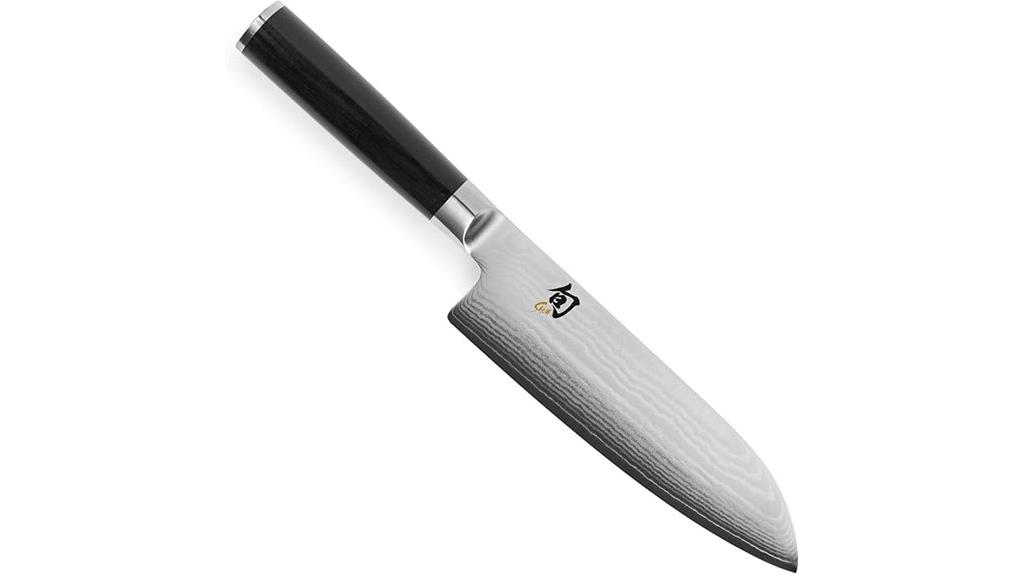
If you’re looking for a versatile, high-quality santoku knife that combines traditional craftsmanship with modern performance, the Shun Classic 7-inch Santoku Knife is an excellent choice. Handcrafted in Japan, it features a 7-inch Damascus-style, high-carbon stainless steel blade with 16 layers, offering both beauty and durability. Its wide, slightly curved blade makes chopping, slicing, and dicing effortless, while the D-shaped ebony Pakkawood handle provides comfort and a secure grip. Known for its sharpness and balance, this knife is perfect for a variety of ingredients. Many users praise its rust-resistant steel, elegant design, and ability to stay sharp through heavy use.
Best For: home cooks and professional chefs seeking a versatile, durable, and aesthetically elegant santoku knife for all-purpose kitchen tasks.
Pros:
- Exceptional sharpness and edge retention, maintaining performance through heavy use
- Handcrafted in Japan with high-quality materials and a beautiful Damascus pattern
- Lightweight, well-balanced, and comfortable handle for easy, safe handling
Cons:
- Higher price point, which may be a consideration for budget-conscious buyers
- Requires hand washing to preserve the blade and handle, despite being dishwasher safe
- Slightly higher tendency to chip compared to German steel knives due to its high HRC steel core
KYOKU 7 Inch Santoku Knife – Daimyo Series
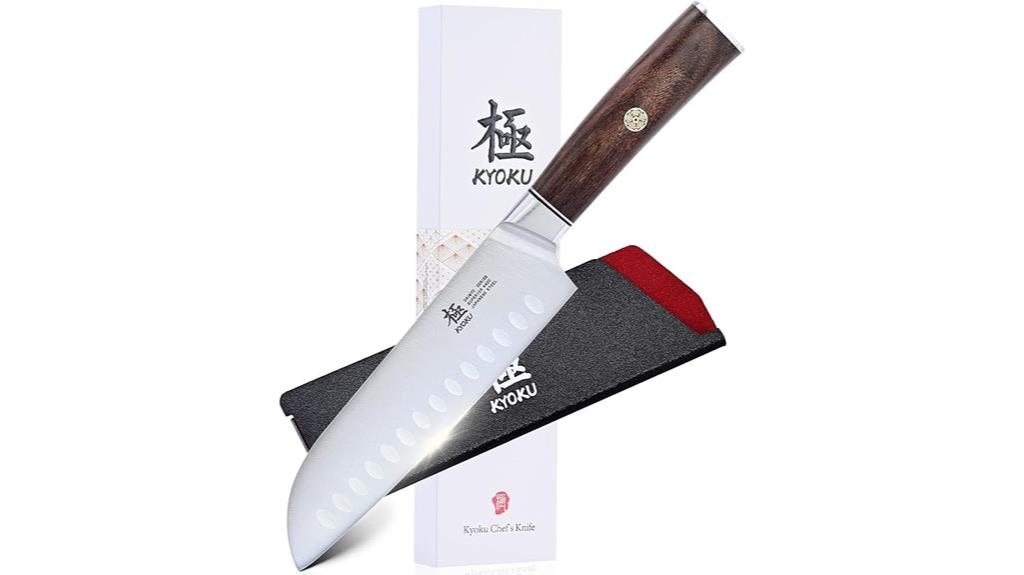
The KYOKU 7 Inch Santoku Knife from the Daimyo series stands out as an excellent choice for both professional chefs and home cooks who demand precision and durability. Crafted from Japanese 440C stainless steel, it’s vacuum heat treated for added strength and sharpened to 13-15 degrees, offering a hardness of 59-60 HRC. Its ultra-sharp blade handles meat, fish, fruits, and vegetables with ease, delivering clean, accurate slices with minimal resistance. The ergonomic rosewood handle with mosaic pin ensures a comfortable grip, while the balanced weight reduces fatigue. Plus, it comes with a protective sheath, making storage safe and convenient for everyday use.
Best For: home cooks and professional chefs seeking a versatile, durable, and sharp Santoku knife for precise slicing of various ingredients.
Pros:
- Made from high-quality Japanese 440C stainless steel with excellent edge retention and corrosion resistance
- Ergonomic rosewood handle with mosaic pin for comfortable and secure grip
- Balanced weight distribution reduces fatigue during extended use
Cons:
- Slightly heavier than some lightweight knife options, which may take getting used to
- Requires proper maintenance to preserve the wooden handle and blade sharpness
- Comes with a protective sheath, but storage in the case may require careful handling to avoid damage
HexClad 7-Inch Japanese Damascus Stainless Steel Santoku Knife
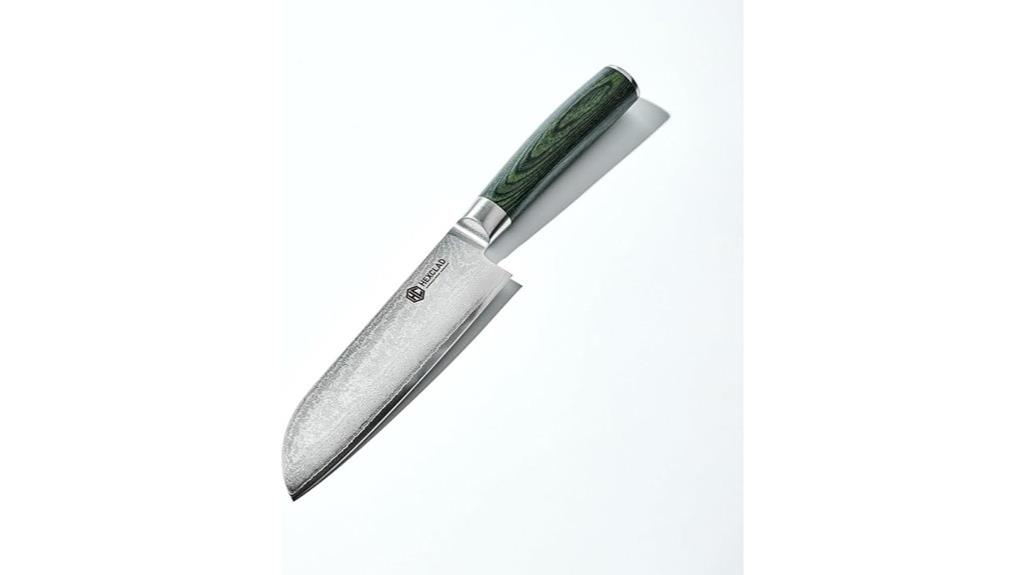
For home cooks who value a sharp, versatile knife that can handle multiple tasks, the HexClad 7-Inch Japanese Damascus Stainless Steel Santoku Knife stands out as an excellent choice. Its 67-layer Damascus steel creates a durable, sharp blade that stays keen longer, thanks to a 3-step Honbazuke heat treatment and a 12-degree edge. The forged 6.7-inch blade, paired with a comfortable Pakkawood handle, offers exceptional control for slicing, dicing, and mincing. Users love its balance, sharpness, and ease of maintenance—simply hand wash to preserve it. With a lifetime warranty and over 900 positive reviews, it’s a reliable, stylish addition to any kitchen.
Best For: home cooks and culinary enthusiasts seeking a versatile, durable, and sharp knife for everyday kitchen tasks.
Pros:
- Exceptional sharpness and edge retention that can shave hair, ensuring precise cuts.
- Elegant design with a high-quality Damascus steel blade and comfortable Pakkawood handle.
- Easy to maintain with hand washing, and backed by a lifetime warranty for peace of mind.
Cons:
- Higher price point compared to some other kitchen knives.
- Hand washing required to preserve warranty and prevent damage, which may be less convenient for some users.
- Not suitable for cutting on hard surfaces, as it can void the warranty and cause damage.
DDF Kitchen Knife, 7-Inch Japanese Stainless Steel Santoku Chef’s Knife

Designed for both home cooks and professional chefs, the DDF Kitchen Knife‘s 7-inch Japanese stainless steel blade combines sharpness, durability, and balance. Crafted from high-quality Japanese steel with 0.45%-0.55% carbon and 14%-15% chromium, it resists corrosion and rust. The forged construction guarantees lasting sharpness and strength, while the 58 HRC hardness maintains its edge through regular honing. Its double-edged, 15-degree per side blade suits both left- and right-handed users. The ergonomic stainless steel handle offers comfort and control, even when wet. Lightweight and well-balanced, this versatile knife effortlessly handles chopping, slicing, and dicing, making it a valuable addition to any kitchen.
Best For: home cooks and professional chefs seeking a versatile, sharp, and durable 7-inch Santoku knife for everyday kitchen tasks.
Pros:
- Highly sharp with excellent edge retention, making slicing effortless
- Well-balanced, ergonomic handle for comfortable extended use
- Made from high-quality Japanese stainless steel, resistant to rust and corrosion
Cons:
- No protective sheath included, requiring careful storage
- Hand washing recommended to maintain longevity, despite dishwasher compatibility
- Slightly heavier weight at 8 ounces may be less suitable for those preferring ultra-light knives
Home Hero Japanese Santoku Knife Collection

If you’re seeking a versatile, high-quality Santoku knife that combines sharpness with elegant craftsmanship, the Home Hero Japanese Santoku Knife Collection stands out. It features VG10 Damascus steel with 67 layers, delivering exceptional sharpness and durability. The 5-inch blade is forged for strength and perfect for slicing, mincing, and dicing. Its rosewood handle is ergonomically contoured for comfort and control, while the full tang adds stability. Packaged in a sleek black box with a protective sheath, it’s an excellent gift option. Though not dishwasher safe, its sharpness and craftsmanship earn high praise—many users find it performs like a professional-grade knife at an affordable price.
Best For: home cooks and professional chefs seeking a versatile, high-quality Santoku knife with exceptional sharpness and elegant craftsmanship.
Pros:
- Crafted with VG10 Damascus steel featuring 67 layers for outstanding sharpness and durability
- Ergonomically contoured rosewood handle provides comfort and full control during use
- Elegant packaging with a protective sheath makes it an excellent gift option
Cons:
- Not dishwasher safe, requiring careful hand washing and maintenance
- Some users have concerns about handle length comfort and steel authenticity on lower-cost versions
- Made in China, which may raise questions about manufacturing quality for some buyers
Traditional Japanese Kitchen Knife Set (Gyuto, Santoku, Nakiri, Petty)
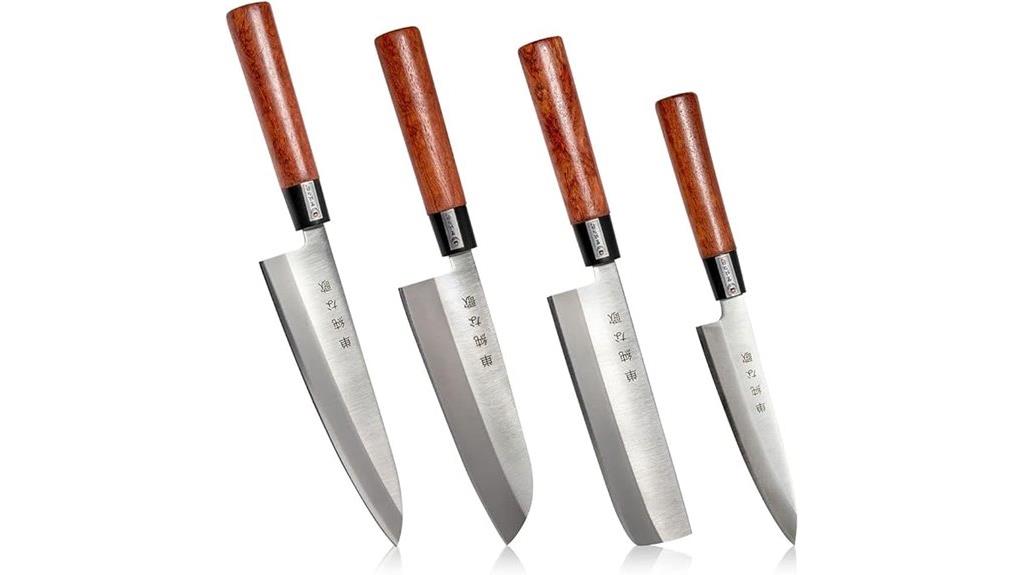
A traditional Japanese kitchen knife set, including Gyuto, Santoku, Nakiri, and Petty, offers a versatile collection tailored for both professional chefs and home cooks who want precision and durability. Crafted from 420HC stainless steel, these knives feature heat-treated blades for sharpness, hardness, and corrosion resistance, handling meat, vegetables, and fruits with ease. The full-tang construction guarantees strength and balance, while polished Rosewood handles provide a comfortable grip and aesthetic appeal. Designed for heavy-duty chopping, slicing, and delicate tasks, this set covers all culinary needs, making it an excellent investment for elevating your kitchen game.
Best For: home cooks and professional chefs seeking a durable, versatile Japanese knife set for all kitchen tasks.
Pros:
- Crafted from high-quality 420HC stainless steel for sharpness, corrosion resistance, and durability
- Full-tang construction and polished Rosewood handles provide excellent balance and a comfortable grip
- Includes essential knives (Gyuto, Santoku, Nakiri, Petty) suitable for a wide range of cooking tasks
Cons:
- Some users may find the knives relatively heavy and initially dull, requiring sharpening
- Not dishwasher safe, demanding careful hand washing and maintenance
- Slightly higher weight may be less suitable for those preferring lightweight knives
7 Inch Santoku Knife, Ultra Sharp Japanese High Carbon Powder Steel Kitchen Knife
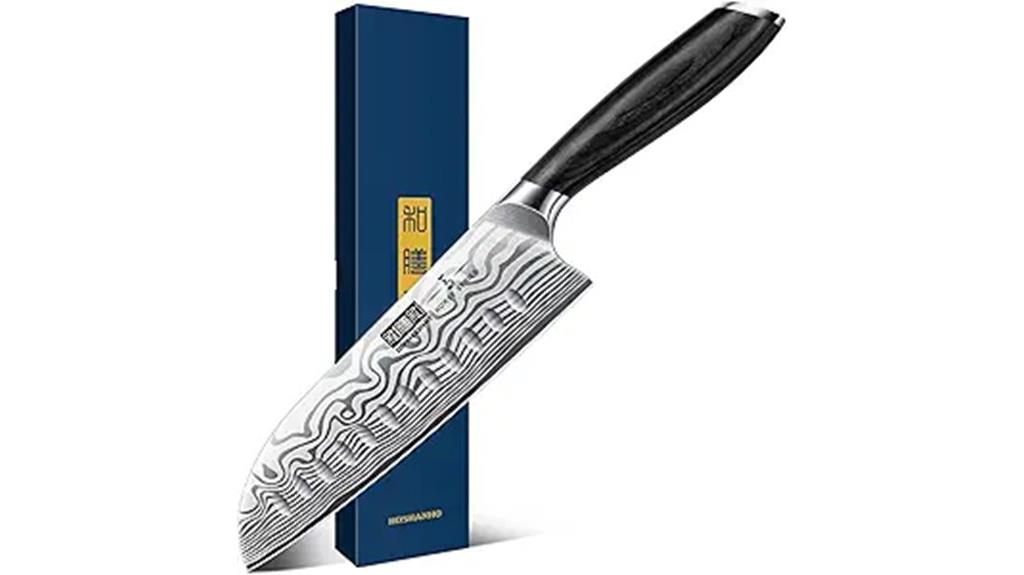
For serious home cooks and professional chefs who demand precision and durability, the 7-inch Santoku Knife crafted from high carbon powder steel stands out as an exceptional choice. Its blade, forged at 62 Rockwell hardness, offers remarkable edge retention, corrosion resistance, and strength. The scalloped, razor-sharp edge makes slicing, dicing, and chopping effortless across fruits, vegetables, meats, and fish. The elegant, highly polished design features motifs reminiscent of damasco patterns, complemented by a comfortable Pakkawood handle for a stable grip. Weighing about 7.1 ounces, this knife balances performance and comfort, making it a versatile, reliable tool for everyday culinary tasks.
Best For: home cooks and professional chefs seeking a durable, ultra-sharp, and versatile Santoku knife for precise slicing, dicing, and chopping.
Pros:
- Exceptional edge retention and corrosion resistance due to high carbon powder steel construction
- Ergonomic Pakkawood handle provides a comfortable, stable grip for extended use
- Elegant, handcrafted design with damasco motifs enhances aesthetic appeal and makes it a great gift
Cons:
- Not dishwasher safe; requires careful hand washing to maintain edge quality
- Slightly heavier weight may be less suitable for users preferring a very lightweight knife
- Hand-finished craftsmanship may result in higher maintenance to keep the blade in optimal condition
Factors to Consider When Choosing Japanese Santoku Knives
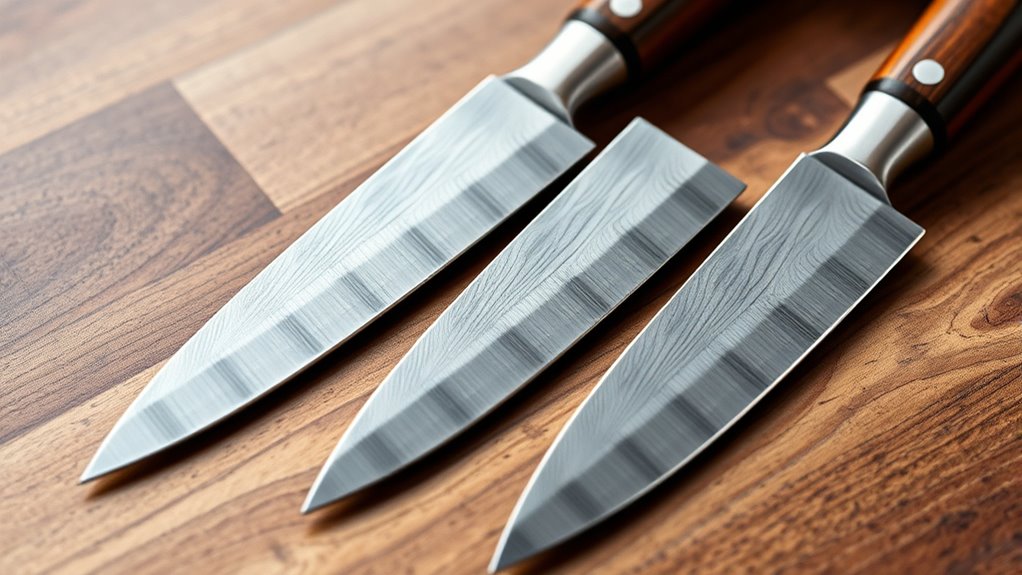
When choosing a Japanese Santoku knife, I focus on key factors like blade material quality, sharpness, and edge retention to guarantee it cuts effortlessly. I also consider handle ergonomics for comfort during extended use, along with blade size and weight to match my tasks. Finally, I look at how easy it is to maintain the knife to keep it in top condition over time.
Blade Material Quality
Choosing a Japanese Santoku knife hinges heavily on the quality of its blade material, as this directly impacts performance and durability. High-quality blades often use super steels like VG-10, SG2, or 440C, which deliver excellent hardness and edge retention. The steel’s carbon content, typically between 0.9% and 1.5%, plays a vital role in how well the knife holds its edge and resists rust and corrosion. Forged blades tend to be stronger and more durable than stamped ones, especially when layered with Damascus or clad steel for both performance and aesthetic appeal. The steel’s hardness, usually measured between 58 and 62 HRC, balances sharpness with flexibility, reducing chipping. Proper heat treatment and steel selection make certain your knife remains sharp, resilient, and long-lasting.
The sharpness of a Japanese Santoku knife depends largely on its edge angle and the steel’s hardness, which together determine how well it cuts and how long it stays sharp. A typical edge angle between 12 to 15 degrees per side provides precise, effortless slicing. High-quality blades are often made from hardened steel with a hardness of 58-62 HRC, helping them maintain a razor-sharp edge through extended use. Regular honing or hand-sharpening is essential to preserve *ideal* sharpness and prevent dulling. Features like scalloped or hollow edges reduce food sticking and improve cutting efficiency, enhancing perceived sharpness. Proper maintenance, including gentle hand washing and careful storage, also plays a *crucial* role in keeping the edge pristine and ensuring your knife performs at its best over time.
Handle Ergonomics
A handle’s ergonomic design directly impacts how comfortably and effectively you can use your Japanese Santoku knife. A well-designed handle should fit comfortably in your hand, reducing fatigue during extended chopping or slicing. Handles with textured surfaces or non-slip materials are essential, especially when your hands are wet or greasy, ensuring a secure grip. The shape of the handle, whether octagonal or oval, influences maneuverability and comfort for different hand sizes. Proper balance between the handle and blade contributes to smoother cuts and less wrist strain. Materials like Pakkawood or G10 are excellent choices because they’re durable, moisture-resistant, and maintain their ergonomic integrity over time. Prioritizing handle ergonomics helps you work more precisely and comfortably in the kitchen.
Blade Size & Weight
When selecting a Japanese Santoku knife, paying attention to blade size and weight can make a significant difference in your cooking experience. Blade sizes typically range from 5 to 7 inches, with 6 to 7 inches being the most versatile for everyday tasks. Heavier models, over 12 ounces, provide more force with each cut but may require more strength and control. Lighter knives, around 5 ounces, offer better agility and are ideal for delicate, intricate work, especially for smaller or less powerful hands. A well-balanced blade size and weight help improve control and reduce fatigue during prolonged use. Choosing the right combination depends on your cutting style and comfort, ensuring you can handle the knife efficiently without strain.
Ease of Maintenance
Choosing a Japanese Santoku knife means considering how easy it is to maintain over time. I’ve found that most high-quality knives require hand washing and immediate drying to prevent rust, especially those with high-carbon steel blades. Regular honing with a ceramic rod or whetstone keeps the edge sharp and cutting smoothly. Applying a light coat of mineral oil or knife oil periodically helps protect against moisture and rust, extending the knife’s lifespan. Proper storage in a sheath, knife block, or magnetic strip prevents damage and dulling. Consistent cleaning and thorough drying are essential to avoid rust spots, particularly on layered or Damascus steel blades. Overall, ease of maintenance depends on choosing a knife with manageable upkeep, ensuring it stays sharp and functional for years.
Aesthetic & Craftsmanship
The aesthetic appeal and craftsmanship of Japanese Santoku knives are immediately evident in their intricate patterns, refined finishes, and carefully designed handles. Damascus patterns or hammered tsuchime finishes add visual interest, while natural wood handles reflect traditional artistry. High-quality craftsmanship shines through in meticulously hand-forged blades, precise edge honing, and detailed handle design, all contributing to a sense of elegance. Premium materials like VG10 steel, layered Damascus steel, or exotic woods enhance both beauty and perceived value. Small details such as copper wire accents or mosaic pins elevate the knife’s sophistication, transforming it into a display-worthy piece. Overall, the blade shape, finish, and handle artistry communicate the skill, heritage, and dedication behind each knife, making aesthetics a crucial factor when choosing your perfect Santoku.
Versatility in Use
Japanese Santoku knives are inherently versatile tools, designed to handle a wide range of kitchen tasks with ease. Their multi-purpose nature means I can use them for slicing, dicing, chopping, and mincing a variety of ingredients. The typical 5 to 7-inch blade size offers excellent control, allowing me to switch seamlessly between delicate tasks like thin slicing of fish and heavy-duty chopping of vegetables or meat. Features such as scalloped or hollow edges help reduce food sticking, making prep faster and cleaner. The wide blade profile provides both precision and power, suitable for everything from slicing fruits to chopping herbs. With high-quality steel and sharp edges, these knives deliver consistent performance, making them indispensable for both everyday cooking and more elaborate culinary creations.
Price & Brand Reputation
When selecting a Santoku knife, considering the price and brand reputation can make a big difference in guaranteeing you get a reliable, high-quality tool. Established brands with strong reputations often offer knives that stay sharp and durable over time, giving you confidence in your investment. They typically provide warranties and customer support, which adds peace of mind. While premium pricing from reputable brands reflects superior craftsmanship, high-grade materials, and consistent performance, cheaper options might compromise on edge retention, handle quality, or durability. It’s wise to read consumer reviews and ratings to gauge a brand’s reputation and value. Ultimately, investing in a well-known brand often assures a longer-lasting, more dependable kitchen companion, even if it costs a bit more upfront.
Frequently Asked Questions
What Makes a Santoku Knife Different From Other Japanese Kitchen Knives?
A santoku knife differs from other Japanese kitchen knives mainly in its shape and purpose. I find its shorter, wider blade makes it perfect for precise chopping and slicing. Unlike a gyuto, which is more like a Western chef’s knife, the santoku has a straighter edge and a flatter profile, allowing for clean cuts with less effort. It’s versatile, comfortable, and ideal for everyday kitchen tasks.
How Should I Properly Care for and Maintain My Japanese Santoku Knife?
You should hand wash your Japanese santoku knife and dry it immediately—because apparently, ignoring basic care is the secret to longevity. I always make sure to sharpen it regularly with a whetstone and store it safely in a knife block or on a magnetic strip. Avoid dishwasher use and cutting on hard surfaces. Proper care keeps your knife sharp, shiny, and ready to impress—trust me, it’s worth the effort.
Are There Specific Foods or Tasks Best Suited for a Santoku Knife?
I find that a santoku knife is perfect for slicing vegetables, dicing fruits, and even chopping boneless meats. Its sharp, lightweight design makes precise cuts easier and more efficient. I especially love using it for tasks like dicing onions or slicing tomatoes because of its balanced weight and sharp edge. If you’re preparing a variety of ingredients, a santoku really shines, making your prep faster and more enjoyable.
What Is the Typical Price Range for High-Quality Japanese Santoku Knives?
High-quality Japanese santoku knives typically range from $50 to $200, depending on the brand, materials, and craftsmanship. I’ve found that investing in a knife within this range offers great durability and sharpness for everyday cooking. If you’re serious about your kitchen tools, spending a bit more can get you a beautifully crafted knife that lasts for years. Remember, a good santoku is an investment in your cooking experience.
Can a Santoku Knife Replace a Chef’s Knife in Everyday Cooking?
Sure, a santoku can replace a chef’s knife—if you enjoy juggling tasks with a slightly smaller, more precise blade. I’ve found it’s perfect for slicing, dicing, and mincing, but when it comes to heavy-duty chopping or breaking down large poultry, I still reach for my trusty chef’s knife. Think of a santoku as a versatile sidekick rather than a full replacement; it’s great, but not a one-size-fits-all.
Conclusion
So, whether you’re slicing, dicing, or mincing, the right santoku knife can transform your kitchen into a culinary playground. Think of it as your trusty sidekick—sharp, reliable, and ready for any challenge. With the options I’ve shared, you’re equipped to find a perfect match that’ll elevate your cooking game to new heights. Grab one, and watch your culinary skills flourish like a garden in full bloom!
